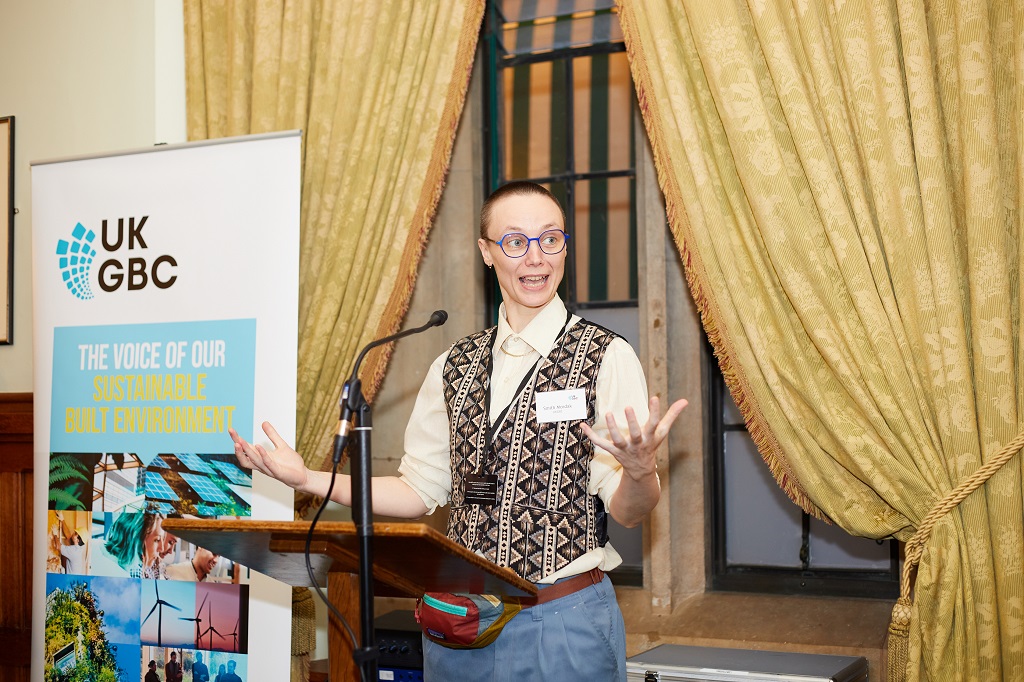Five questions for UKGBC’s new chief executive
Smith Mordak was appointed as CEO of the UK Green Building Council earlier this year. Three months into the role, they sat down with Place North West to discuss the importance of collaboration and turning goodwill around the climate crisis into action.
What attracted you to the role?
One of the main reasons that I wanted to join UKGBC is the amazing network of over 700 members from all the way across the value chain.
That’s really important to me because I don’t like to sit in a silo. It’s really brilliant to have that cross-industry collaboration and the UKGBC is brilliant for that.
I also think it’s really good to be able to work together outside of a competitive environment in a much more collaborative way and actually address these big issues that we have together.
What is your top priority as CEO of the UKGBC?
We’re developing the UK’s first climate resilience roadmap, which is looking at not only the kinds of targets and objectives that we need to set so that we can measure our success but also taking an adaptive pathways approach.
There are so many different climate scenarios that we may be facing so we need to understand what kind of actions we might need to take in all kinds of eventualities.
One example might be around flood risk. Lots of different parts of the country are facing flooding and we need to think quite strategically about how we manage that. That might be about things like using green spaces differently in order to accommodate additional extreme weather events.
[Another priority is] systems change. That sounds kind of abstract but we at UKGBC have been doing lots of work in lots of different areas around climate mitigation and resilience for a long time and also broader things like the circular economy and social value, and so on.
All of these things interconnect so we’re starting to look at system change as a whole. How do we understand how the overall system of the built environment works? And what are the shifts that we need to make collectively? Some of the things that we might need to do are not things that individual actors can do [they are] things that we need to actually collaborate on.
What are the biggest barriers to change when it comes to making the built environment greener?
It really varies. In some areas, we still don’t have a really good deep understanding of the targets that we need to meet, some of that is still very much emerging.
In other areas, we’ve got lots and lots of commitments, but the challenge is more about how you translate those commitments into action.
We know that we need to hit net zero for all of our buildings and we know that we need to retrofit all of our homes. There are these big targets, but actually, how do we achieve the kind of organisational and cultural change that enables those things?
Are the net zero deadlines – like 2038 for Manchester and 2050 for the UK – achievable?
The science tells us that we need to [hit the targets] otherwise we’re going to be facing even more severe consequences. So it is not a question of taking a target and [asking] ‘is it realistic’. It is more like, okay, this is what the science says, we need to do if we’re going to prevent really serious existential threats and crises.
The built environment industry has so many skills, so much expertise, so many resources, it’s just a question of how we apply those
It is almost a question of logistics and management, right? I always think that project managers are going to be the heroes of this.
Is the industry taking the pursuit of net zero seriously enough?
Yes and no. I think a lot of people are taking this very seriously. But at the same time, it is a really big and overwhelming [thing] that is not easy to manage.
I think that collectively, quite often, it’s very difficult to translate those kinds of commitments and high-level will to make a difference into action because of the personal, psychological overwhelm that we can have.
And then also the organisational difficulties around change, political struggles, economic struggle, all of these different pressures make it really, really difficult to affect change.
The understanding of the severity of the crisis is there but I think we need to do more to translate that into action. That’s why I’m taking this job because I think that the UKGBC is an important player in the ecosystem of changemakers.





Impossible to achieve without impoverishing the nation while the major global emitters laugh at us. Form as many green Quangos as you like, it ain’t gonna happen.
By Eco Realist